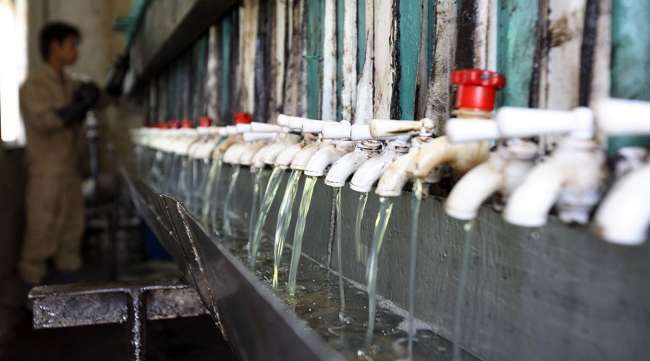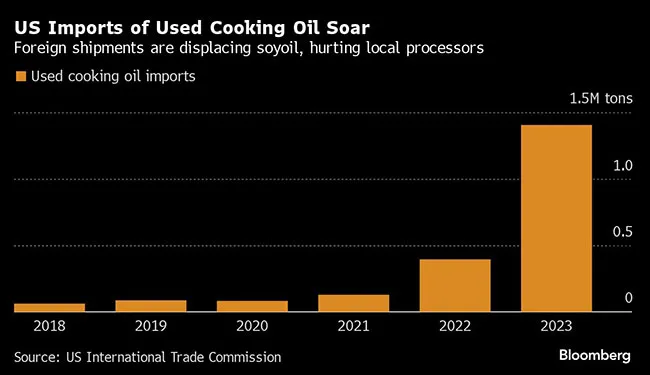Suspicious Chinese Frying Oil Hurting US Biofuels Business

[Stay on top of transportation news: Get TTNews in your inbox.]
China is flooding the U.S. with used cooking oil that the biofuel industry says may be tainted, hurting American farmers and President Joe Biden’s push to promote climate-friendly energy.
U.S. imports of used cooking oil, an ingredient used to make renewable diesel, more than tripled in 2023 from a year earlier, with more than 50% coming from China, according to the U.S. International Trade Commission. American industry groups and biofuel executives are becoming increasingly worried that a significant amount of those supplies are fraudulent and are urging the government to tighten scrutiny on the imports.
RELATED: ATRI Study Touts Renewable Diesel’s Benefits
The heightened suspicions come after the European biofuel industry expressed similar concerns about cooking oil from China last year. Used cooking oil has a better carbon intensity score than feedstocks widely produced in the U.S. like fresh soybean oil, so any potentially tainted imports are benefiting from Biden’s renewables incentives at the expense of American farmers.
“We’re putting more pressure on the U.S. government to say what are we really importing,” said Todd Becker, CEO of Green Plains, which through its production of ethanol sells distillers corn oil, also a green diesel ingredient. “Somebody’s got to figure out that that’s not all Chinese used cooking oil.”
RELATED: Diesel Price Sheds 5.3¢ to $3.894 a Gallon
Tainted used cooking oil would exacerbate a challenging situation for farmers and agriculture companies. Companies including Bunge Global SA and Archer-Daniels-Midland Co. have been counting on soaring demand for crop-based green diesel feedstocks, but competition from foreign imports is eating into profits and jeopardizing ambitious expansion plans. More broadly, there is a risk that illegal shipments could worsen trade tensions between China and the U.S. ADM ranks No. 74 on the Transport Topics Top 100 list of the largest private carriers in North America.
Imports of used cooking oil amounted to 1.4 million metric tons (3.1 billion pounds) in 2023 — equivalent to the oil squeezed from more than 6% of U.S. soybeans crushed to make soy oil last season. In addition to having a more favorable carbon intensity score, UCO is also priced about a third cheaper than refined soy oil.
RELATED: West Coast Swapping Diesel for Biofuels
One of the biggest concerns is that China shippers are adding UCO to fresh palm oil. Palm, the world’s most widely used vegetable oil, is a bane to environmentalists and many countries because the industry is a key driver of deforestation in places like Indonesia and also is tied to labor abuses.

China’s Ministry of Commerce didn’t respond to a faxed request for comment.
The Environmental Protection Agency has had discussions with industry stakeholders, including the National Oilseed Processors Association, about concerns over increased imports of UCO and other food wastes, according to agency spokesman Nick Conger. He said the EPA is aware of the increased imports and that will be a factor in establishing volumes for and implementing the Renewable Fuel Standard Program, a law that mandates how much biofuel must be blended into the country’s fuel supply each year.
RELATED: ATA, 8 Others Ask EPA to Adjust Biofuel Output Volumes
Under RFS, producers using UCO or animal waste, such as beef tallow, are required to keep records that vow the ingredients meet the legal definition of renewable biomass as well as describe the ingredient and identify the process used to obtain it.
Check out Transport Topics' updated Top 100 list of the largest logistics companies in North America, and explore how the industry's top players have adapted to a tough freight market and are preparing for the future. Tune in above or by going to RoadSigns.ttnews.com.
“We are concerned that unless EPA and other agencies get a handle on this pretty quickly, it could potentially undermine the integrity of the Renewable Fuel Standard,” said Geoff Cooper, CEO of the Renewable Fuels Association.
The surge in UCO imports is a top issue for NOPA, the trade group representing U.S. seed processing industries for soybeans, canola and other crops. CEO Kailee Tkacz Buller said the group has had talks with federal lawmakers and agencies, including the EPA and Department of Agriculture.
Asia is by far the world’s biggest UCO supplier, led by China. The European Union initiated a probe into Asian imports last year at the request of European biodiesel producers, but the request was dropped. While the producers didn’t explicitly provide a reason for the change, they noted that biodiesel shipments to the EU from China’s Hainan Island — a green-fuel hot spot — immediately stopped after the start of the investigation.
“There is plenty of suspicion and lots of stories and anecdotes floating around,” Cooper said. “It appears to be one of the worst kept secrets out there that this is happening.”
Kim Chipman, Tarso Veloso and Michael Hirtzer contributed to this report.
Want more news? Listen to today's daily briefing below or go here for more info:





